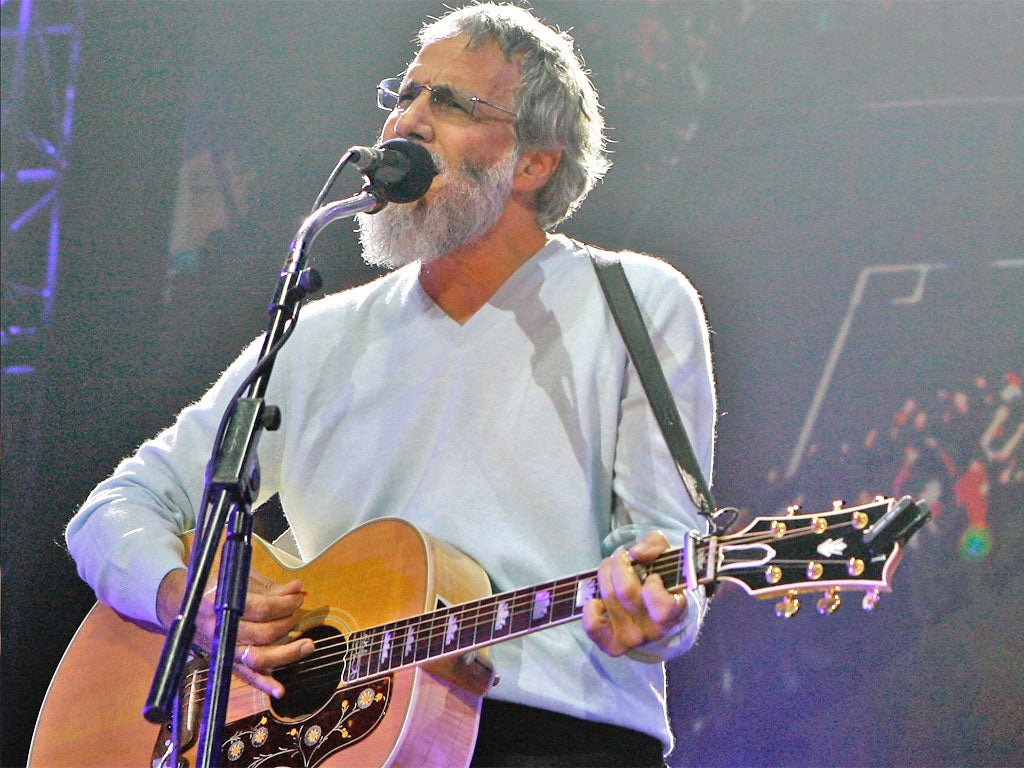Robert Fisk: 'If only Hague and Clinton would listen to Yusuf Islam'
Our writer sees Cat Stevens thrill an audience in Beirut and give his verdict on a Wild World


Your support helps us to tell the story
From reproductive rights to climate change to Big Tech, The Independent is on the ground when the story is developing. Whether it's investigating the financials of Elon Musk's pro-Trump PAC or producing our latest documentary, 'The A Word', which shines a light on the American women fighting for reproductive rights, we know how important it is to parse out the facts from the messaging.
At such a critical moment in US history, we need reporters on the ground. Your donation allows us to keep sending journalists to speak to both sides of the story.
The Independent is trusted by Americans across the entire political spectrum. And unlike many other quality news outlets, we choose not to lock Americans out of our reporting and analysis with paywalls. We believe quality journalism should be available to everyone, paid for by those who can afford it.
Your support makes all the difference.The uprisings here..." Cat Stevens (or Yusuf Stevens or Yusuf Islam or whatever) began. And the Lebanese audience went as wild as the wild world. They chorused his name. They stood and shouted and clapped. That one word "uprisings" had not a magical effect but a cathartic one, perhaps a kind of drug; it touched everyone. Yusuf Stevens or Yusuf Islam – you'll have to get used to this – stood on the Beirut stage in front of more than a thousand Lebanese. He was scarcely an hour's drive from the Syrian border, an hour and a half from Damascus. No one needed the message spelled out.
But his decision to sing "My People", written long after he decided to embrace Islam and – this is a Fisk opinion, I fear – frittered away more than 20 years of his life without producing the music his fans loved – perfectly fitted these times of excitement and terror in the Middle East. "When you gonna leave/ My People? Give them room to breath/ My People? Stop oppressing My People?"
The Lebanese are a very smart people. They know all about Stevens' conversion to Islam, his deportation from Israel because he allegedly gave funds to Hamas – "I have never knowingly... given money to Hamas" was his response at the time, but, then again, being deported from Israel is, for most Lebanese, the equivalent of a music award. Yusuf Stevens/Islam (again, you have to live with this) was chucked out of the US in 2004 because the gruesomely named Homeland Security – "Heimat" or "Homeland" being a rather Nazi-era word – claimed they had "concerns of ties he (Stevens) may have to potential terrorist-related activities", all denied by Yusuf himself.
This particular allegation – as big a piece of tosh ever to come from the Bush administration (with the exception of WMD, Iraqi ties to al-Qa'ida, etc) – is enough to earn poor old Cat/Yusuf a Nobel Prize in Lebanon. So no wonder they wept to the words of "My People". "My people/ All they need is dignity/ A chance to be free... Let them out of jail... My People/ When you gonna show you care/ Join the people in the square/ My People..." It was a haunting message, but still contained an extraordinary prescience. Let them out of jail. Who now could not think of jails in Egypt or Bahrain or Syria? Who could not think of the people in "the square" without remembering a place called Tahrir?
Stevens was famously caught up by the Muslim call to prayer, the "Adhan" which, so he was told, was "music for God". He had heard of music for money, for fame, for personal power. "I thought," he asked himself then, "music for God? I'd never heard that before." But, personally, I've always wondered about this Stevens reflection. I can think of Bach, Mozart, Haydn, Handel, all the Masses and Oratorios and I ask myself, weren't these classical folk writing music for God? "Confutatis maledictis" ("silence the accursed") may be a little more disturbing than the "Adhan", but surely it's about prayer.
Stevens' new songs seemed to have lost originality – a Muslim woman told me she found the religious songs childish – but the old songs, "I love My Dog", "Father and Son", his fans know them all, retained their freshness. "My People", however, was a kind of re-birth. He loved the whole gig in Beirut – his curtain call almost as long as the second part of the show – but of course the great man had to be made to talk about the "uprisings".
Yusuf Islam (that's what it said on his little booth behind the scenes) was exhausted, blue-tinted glasses now (they didn't suit him) and the usual straggly beard and the slightly tired English voice, someone who had sung the same songs too many times. Or had he?
But I buttonholed him with all the enthusiasm of a cub reporter. The Arab Awakening, Yusuf? Anything to tell the world about the Arab Spring? "I'm inspired," he said. "But I'm also afraid – because of the lack of defined leadership. Dictatorship is easy but democracy is about consensus – and that's hard. But it's like the sun coming up." Great stuff. If only the Clintons and the Hagues and the Juppés could listen to Cat-Yusuf Stevens-Islam...
Join our commenting forum
Join thought-provoking conversations, follow other Independent readers and see their replies
Comments